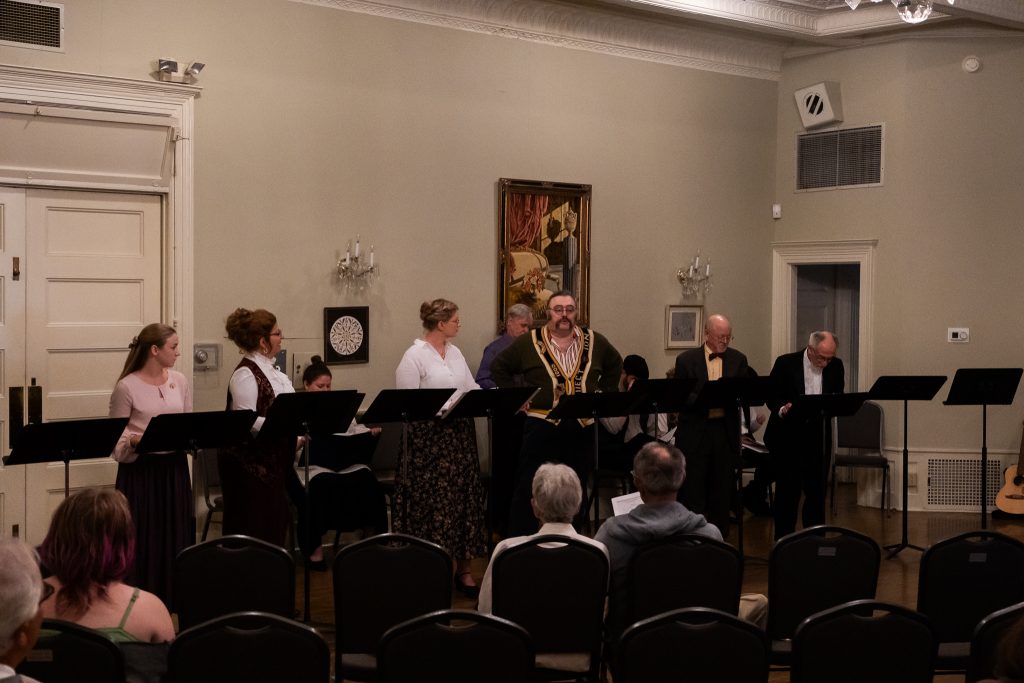Southern Tier Actors Read performed three readings of Anton Chekhov’s play, “The Cherry Orchard,” in the Phelps Mansion Museum’s ballroom this past weekend.
“The Cherry Orchard” is set in the waning years of the Russian Empire and follows the Gayev family. Owners of a once-prosperous estate, the Gayevs grapple with its approaching sale, financial struggles and the decline of the Russian aristocracy. Their estate includes their greatest asset, the cherry orchard, which holds fond memories for the family. However, following the sale of their home to Yermolay Lopakhin, a businessman raised as a peasant, the orchard is set to be chopped down and turned into cottages leased to summer visitors.
Director James Michalec MA ‘13, also the owner of the Face It! Theatre Company, shared the play’s central themes.
“’The Cherry Orchard’ itself is a complex play that one can spend a lot of time unpacking,” Michalec said. “Covering things from the changes in late 19th-century Russia, the breakdown of social classes, the rise of new classes of people, particularly the serfs who had been freed and also businessmen.”
Taking place only a few years before the 1905 Russian Revolution, “The Cherry Orchard” depicts the late condition of the Tsarist Empire, where the noble class was quickly losing its lavish lifestyle after the emancipation of their serfs in 1861 and the subsequent rise of capitalists.
While the play is a comedy, it includes tragic aspects like the Gayev family’s loss of their beloved estate and way of life. An example of these intertwined tragic and comedic aspects is the character of Mrs. Lyuba Ranevsky, owner of the estate and its cherry orchard who cannot process that she is losing everything. Lisa Dutcher, of Endicott, played the role in the reading. She described what it was like to portray the character.
“I found her to be incredibly interesting and a bit challenging to portray, just because she has so many different switches in her mood,” Dutcher said. “She’s crying, she’s laughing, she’s ordering servants, she’s excited to be home. I think she also is pretty naive at times about the fact that her most treasured orchard is going to be sold, and then eventually when she realizes it is happening, she falls apart and she doesn’t know how to deal with it.”
Since the performance was a reading, there was minimal movement and technical aspects included, and the actors were lined up behind stands. The stage directions were read aloud at the start of each act to provide the audience with the necessary context, however, the actors used parts of the museum to help tell the story.
“We used the double doors back there,” Michalec said. “Constantly people were coming in and coming out. We had voices behind the door, we had noises behind the door when someone falls down the stairs, and we also use the stage, which is not where we’re standing in the performance. But we use the stage at the very end to establish the demise of the estate and the cherry orchard and a social class and a way of life as the head butler lies clearly at the end of his life.”
While the butler, Firs, played by Bill Gorman, 88, of Binghamton, was only in a few scenes, his character represented the death of the Russian aristocracy. After the sale of the estate at the end of the reading, he is accidentally left behind when the Gayevs leave. In the final scene, there is movement as Gorman climbs onto the stage and acts out Firs’ death, forgotten by the family he served.
Pat Chadwick, 74, of Wappingers Falls, New York, was an attendee who had previously read the play. He described the importance of Firs’ character.
“I loved the old butler, Firs,” Chadwick said. “He didn’t have that many speaking parts and really was a background character as I read the play, but when it was performed I saw that he was the historical context and conscience of the play.”
With little more than their scripts and stands, the actors successfully brought their rendition of “The Cherry Orchard” to life. A blend of comic and tragic elements, the reading gave viewers a unique way to connect to Chekhov’s famous play and its cultural context.
Michalec emphasized the message of Chekhov’s play.
“Change brings with it the good and the bad,” Michalec said. “When change occurs as social orders break down, we really don’t know what’s going to happen next. I think ‘The Cherry Orchard’ underscores what happens to relationships, what relationships look like when they’re under strain and when they begin to break down and that applies through time. Those circumstances change, but the lessons of change and what they do to us remain the same.”



